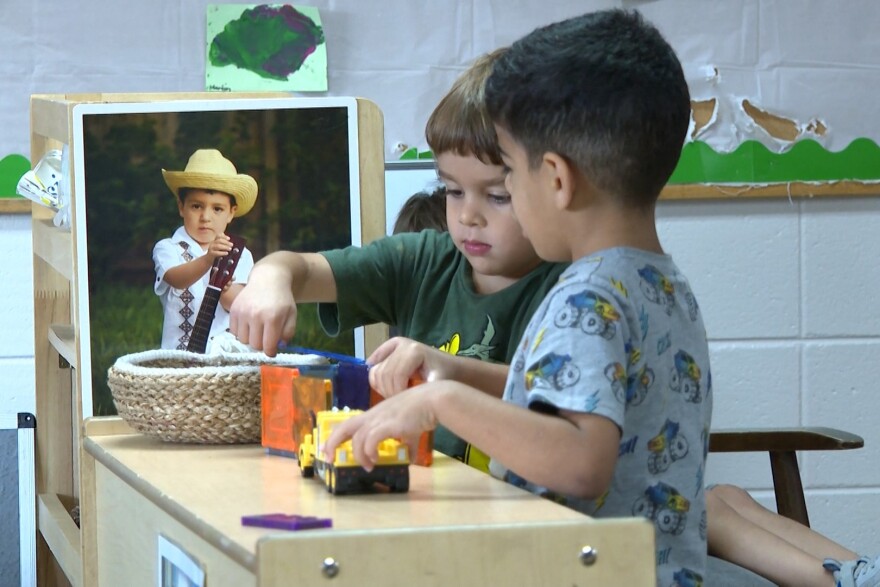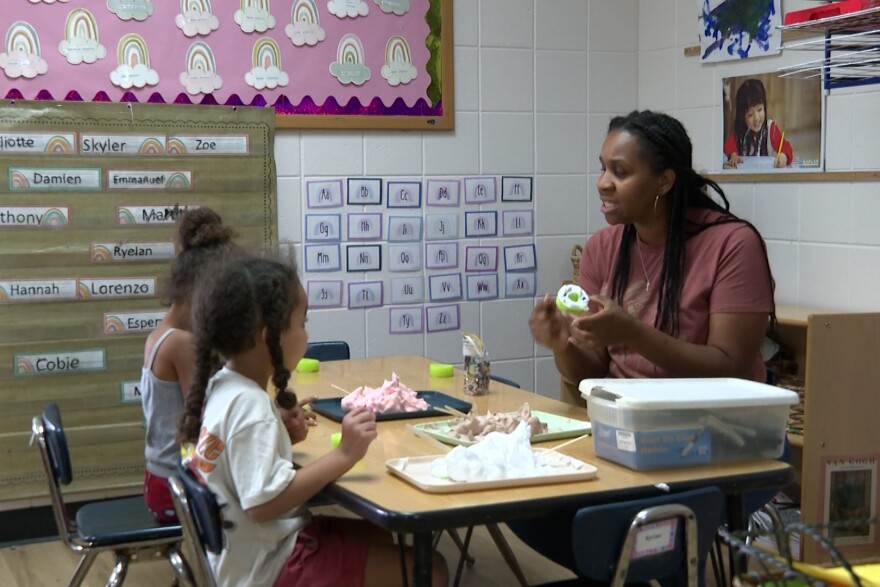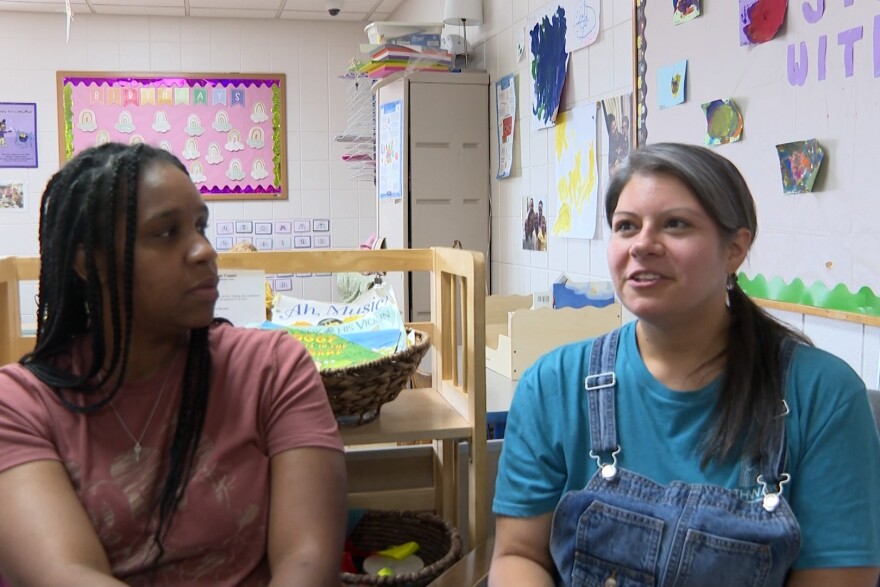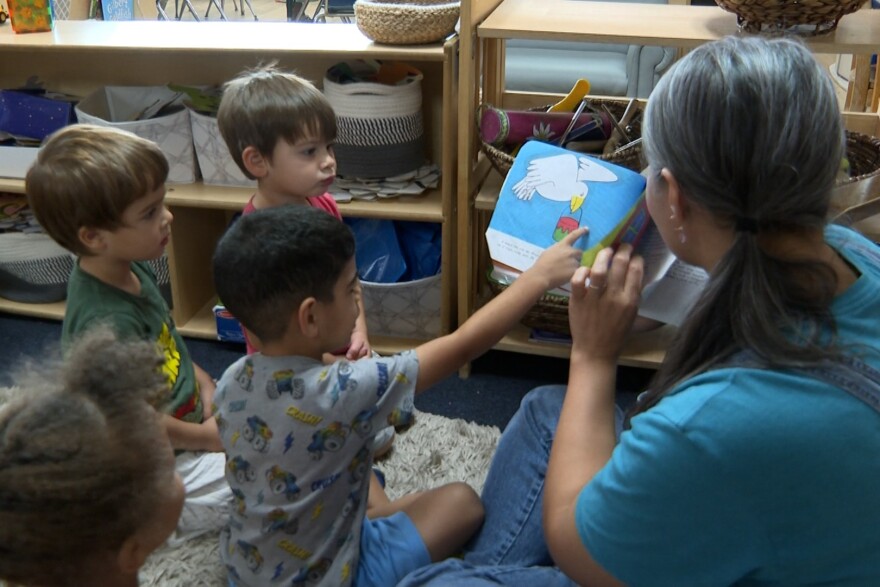Five years after the Covid-19 pandemic, some kids are still behind in their ability to socialize and read when they get to school.
A study from the Journal of the American Medical Association Pediatrics reports that children born during the pandemic are more likely to experience delays in socioemotional development, such as managing emotions and interacting with others.
Locally, the Bloomington Montessori School hasn’t recently seen a significant lack of social skills in young children. The Compass Early Learning Center has.
Shannon Moore works with 3-, 4- and 5-year olds, and Michelle Paxton works with 3-year-olds. Both of them see kids who are behind in their ability to socialize. They attribute this to the pandemic not allowing for a sense of routine and the opportunity to be around other kids.
“For 18 to 24 months of their lives, they were in kind of isolated environments where it was just mom and dad, immediate family, sometimes for brief periods of time, maybe holidays or things like that,” Moore said. “So, they didn't have that really big social component where they were able to socialize with others, or even be around other kids their age.”

Wearing masks during the pandemic caused some kids to fall behind in being able to talk, Moore said. This is also a trend nationally, with Nature, a science journal, reporting that more kids, especially females, born during the pandemic are late talkers compared to those born before the pandemic.
Moore and Paxton said they have a few kids in speech therapy to help them catch up.
“Sometimes they would take in facial expressions, contacting from the overall expression from faces, but we had masks on,” Moore said. “It made it really hard for kids to keep up their speech.”
A study from Nature shows that during the pandemic, kids also spent more time in front of screens. Increased screen time can result in shortened attention spans.
Paxton and Moore have seen these effects play out in the classroom. Kids have a harder time transitioning between activities and contributing to large-group discussions. They say being in front of a screen decreases the opportunity for kids to talk about what they’re watching with others. That’s why they don’t let kids watch screens individually for fun; they only watch short videos in a classroom setting related to the topic they’re learning.
“There's no back and forth, so they're listening to lots of things, and they get excited to watch the things, but they're not able to converse about what they're watching,” Paxton said. “They're not able to necessarily answer questions.”
To help, Moore and Paxton work with kids more on-one-on and give them more time to respond. Helping kids remember the words they need in a specific context can also improve communication.

“If they're pointing and literally trying to communicate their wants to me,” Moore said, “she's like pointing, just giving them the words: ‘Oh, I see you're playing at the milk. Would you like milk?’”
They are also encouraging parents to ask their kids more about their school days so they have another opportunity to practice talking and socializing. Setting time aside on the weekends to spend time with their children can also help them become more comfortable socializing, Moore said. Their biggest piece of advice to parents is to let kids have a choice, not make the choices for them.
“Sometimes families struggle with getting their kids to do certain things, and then it turns into an argument, a fight, and then they get the tablet to get them to stop crying,” Paxton said. “But let your child choose between positive choices that you're okay with as an adult, instead of saying, ‘What do you want for breakfast?’ Because they're going to say pizza, and you're going to say no, and then you've now got a fight where they're upset and you're upset.”

Beth Trammell, professor of psychology at Indiana University East, said other ways to help kids catch up in their ability to socialize can consist of creating a routine, doing breathing exercises and taking brain breaks. She said learning how to regulate emotions can then help kids do better academically.
“A child is not going to meet any academic standards if they can't be regulated in the classroom,” she said. “And so, they're spending a lot of time recognizing that. Emotion regulation really is the precursor to social skills of all kinds, but then also the academic skills.”
A recent study from Curriculum Associates found that the percentage of students who enter kindergarten with reading skills has decreased eight percent. Some of Paxton’s kids reflect this trend; she said some of the older kids are behind in their reading skills and ability to handle books. She measures early literacy skills based on ability to read from left to right and top to bottom, hearing and comprehending a story and being able to answer questions about it.

“Being able to see your name and know that that's your name is definitely something we practice at school,” Paxton said, “and it’s something kids aren't coming in with.”
Paxton and Moore review the features of a book with their kids and help them sound out words. Trammell also recommends parents try to read with their children for at least 20 minutes a day.
“As a parent, I hear that and I think, oh, just 20 minutes, you know, that's not that much time, but it's hard to fit that time in unless you're really intentional about doing it,” Trammell said. “And so, I think our kids are kind of getting less and less practice, particularly with physical books. You know, my kids even have a lot of time on their iPad to do homework or on a screen to do their homework.”
Paxton and Moore say it’s worth the extra time to teach kids how to socialize and keep them engaged.
“It is a lot of work for us, for teachers to plan and do all the things to make sure that we're following their interest and making sure that they have the materials available,” Paxton said, “but that's why we're here.”







